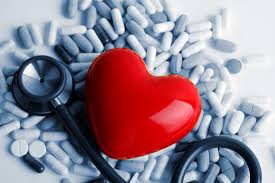
Diagnosed with Cancer? Your two greatest challenges are understanding cancer and understanding possible side effects from chemo and radiation. Knowledge is Power!
Learn about conventional, complementary, and integrative therapies.
Dealing with treatment side effects? Learn about evidence-based therapies to alleviate your symptoms.
Click the orange button to the right to learn more.
- You are here:
- Home »
- Blog »
- Healthy Living Products »
- Chemotherapy-Induced Cardiomyopathy – L Carnitine
Chemotherapy-Induced Cardiomyopathy – L Carnitine

I was diagnosed with chemotherapy-induced cardiomyopathy fifteen years after my conventional cancer treatment.
If you’ve been diagnosed with multiple myeloma you will probably be undergoing chemotherapy off and on for years. Many of those chemo regimens are cardio-toxic meaning, they can damage your heart.
I was diagnosed with MM in early 1994 and underwent
- Induction therapy (5 courses of VAD)
- An Autologous Stem Cell Transplant
- High-dose cytoxan
I was diagnosed with chemotherapy-induced cardiomyopathy in late 2010. One of the many heart healthy but non-toxic therapies I undergo is L-carnitine supplementation daily.
Because various cardio-toxic therapies had done such damage to my body (chemotherapy-induced cardiomyopathy ) I decided not to undergo any toxic heart therapies. I follow a heart healthy diet, heart healthy supplementation and live many heart healthy lifestyle therapies.
I have manage to stabilize and heal much of the damage caused to my heart during active MM therapies. My EF has improved, my BP has stabilized, and my heart rate is normal. All without toxic heart meds. My chemotherapy-induced cardiomyopathy is stable.
To learn more about l-carnitine as well as other evidenced-based but non-toxic heart healthy therapies, scroll down the page, post a question or comment and I will reply to you ASAP.
Hang in there,
David Emerson
- MM Survivor
- MM Cancer Coach
- Director PeopleBeatingCancer
What to know about L-carnitine
“L-carnitine, also known as levocarnitine, is a naturally occurring amino acid structure that the body produces. People can also get it from their diet or take it in the form of an oral supplement. L-carnitine plays a critical role in energy production, as it converts fat into energy.
Most people will get enough L-carnitine from their diet or their body’s production of this compound. Those with low L-carnitine levels may benefit from taking an oral supplement, though.
As well as supporting energy production, L-carnitine may help some other functions in the body, such as maintaining general brain function and reducing the risk of certain disorders.
Some people may experience mild side effects when increasing their L-carnitine intake, especially with long-term use.
In this article, we explore what the current research says about L-carnitine, including its benefits, effectiveness, and side effects.
L-carnitine is a type of carnitine, which is a derivative of amino acids. Amino acids combine to make proteins, which carry out many essential tasks in the body. Carnitine helps the body break down fatty acids and turn them into energy to power the cells.
L-carnitine is a conditionally essential nutrient, meaning that the body can generally make enough of it, but, in some cases, a person may have to get the compound from food or oral supplements if they cannot make enough.
In the body, the liver and kidneys create L-carnitine from the amino acids lysine and methionine. The kidneys can also store L-carnitine for later use and eliminate the excess through the urine stream
Carnitine is a broad term that describes a few different compounds. L-carnitine is a more common form of carnitine, present in the body and many supplements. Other forms of carnitine include:
- Acetyl L-carnitine: This form, sometimes known as ALCAR, also plays a role in metabolism. It possesses neuroprotective properties that may help protect the nervous system.
- D-carnitine: This type is the optical isomer (mirror image) of L-carnitine. It is toxic to the body, as it may inhibit the absorption of other forms of carnitine.
- L-carnitine L-tartrate: Athletes may use this type in the form of sports supplements. Research suggests that it may be useful in minimizing muscle soreness and aiding recovery.
- Propionyl-L-carnitine: This form displays pain relieving and antirheumatic properties, and it may benefit heart health.
L-carnitine, and carnitine in general, is a key component in creating energy for the cells. Its main function, helping break down fatty acids for use as energy, keeps the body’s cells powered and working efficiently.
L-carnitine also has a secondary function of helping remove some waste products from the cells to prevent them from accumulating and causing problems.
In addition to its core functions, L-carnitine may also pose some other benefits to the body. These include:
Heart health
L-carnitine may help with some markers of heart health, although the research is still ongoing.
Supplementation may help improve L-carnitine levels in a failing heart, which could boost heart health and circulation in the short term following a heart attack. Supplementation may also help with symptoms of heart failure, such as chest pain and arrhythmia.
Cancer treatment
At times, cancer treatments, such as chemotherapy, may cause a person to become deficient in L-carnitine. In these cases, L-carnitine supplements may help reduce symptoms such as fatigue and weakness.
Researchers are currently studying the compound as a possible way to prevent tissue damage due to chemotherapy, but this research is in the early stages.
Kidney or liver disease
As the kidneys and liver help create and use L-carnitine, disease in these organs or organ failure may lead to L-carnitine deficiency. Doctors may recommend L-carnitine supplementation in these cases to support the function of the kidneys and liver and prevent deficiency.
Most people tolerate L-carnitine well. However, some individuals may experience digestive side effects when taking L-carnitine. These include:
- stomach cramps
- nausea
- vomiting
- diarrhea
Some people may also complain of a “fishy” body odor, which is not generally harmful but may be bothersome.
Some studies suggest that high levels of L-creatine may raise the long-term risks of cardiovascular diseases, such as atherosclerosis.
L-carnitine supplements may interact with certain antibiotics or anticonvulsants. Anyone considering taking L-carnitine should talk to their doctor to discuss any medications they are taking and the possible drug interactions…”


